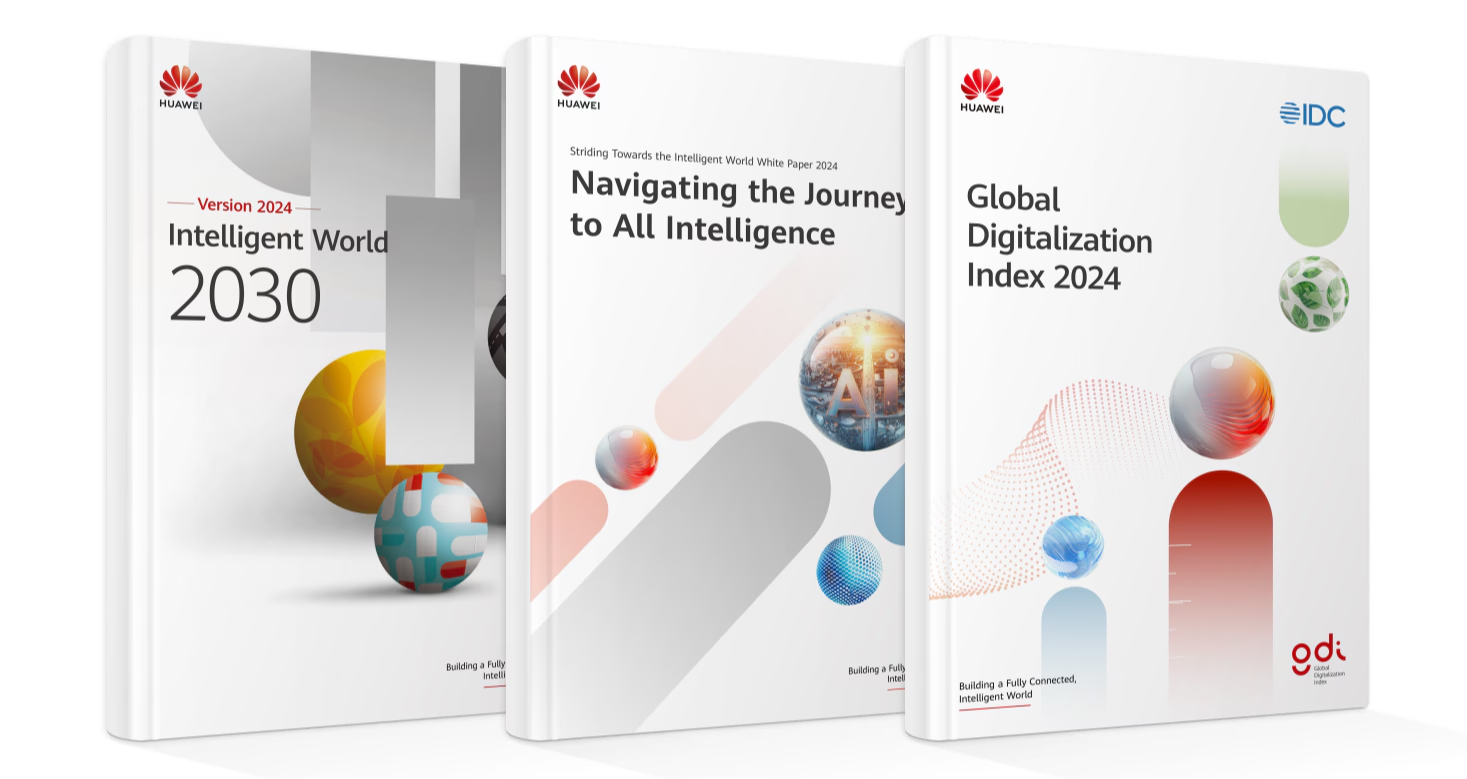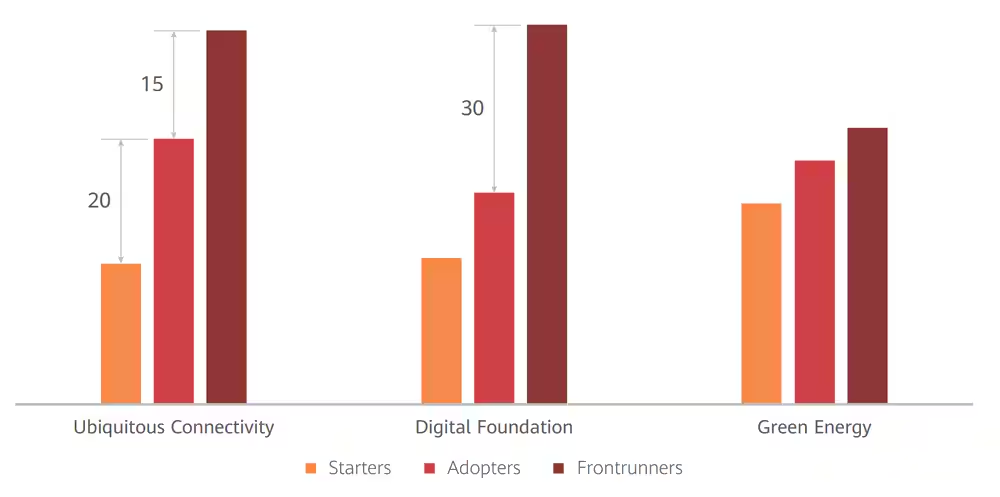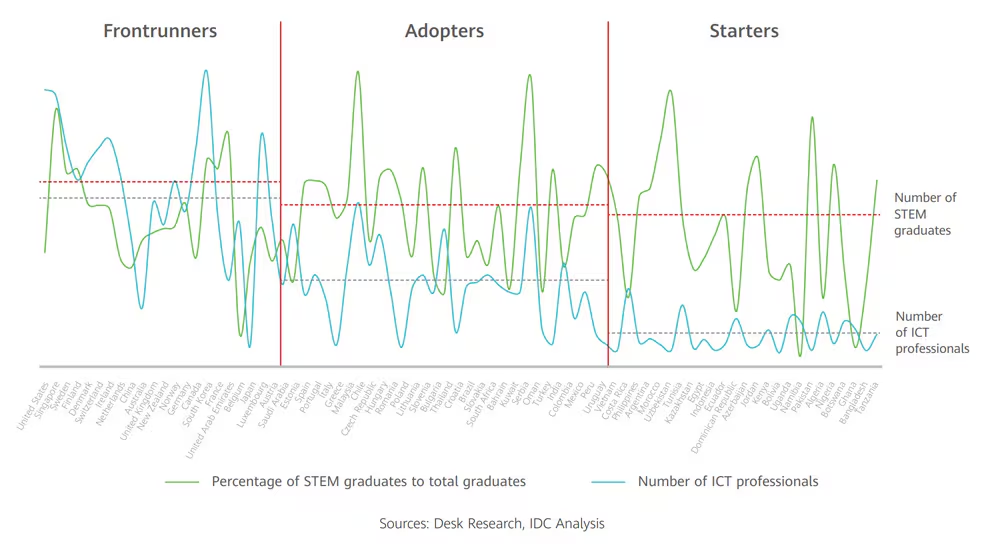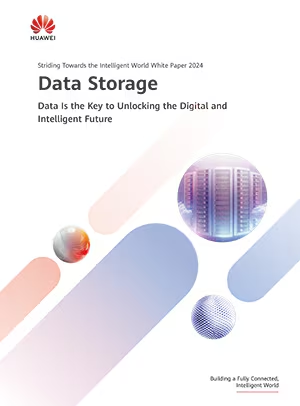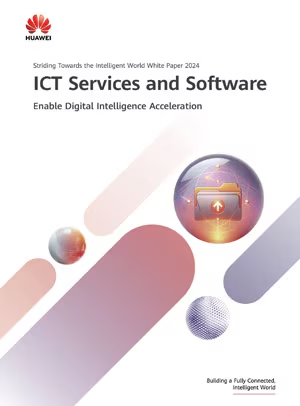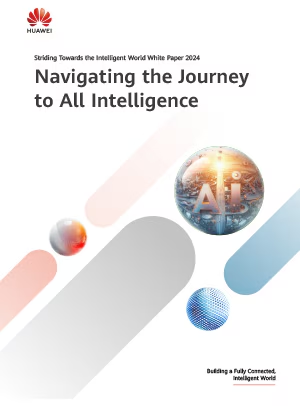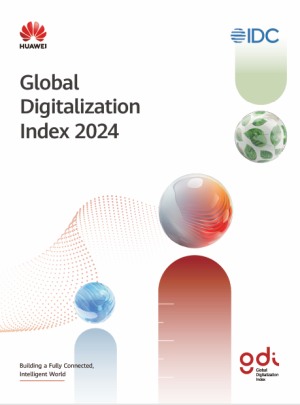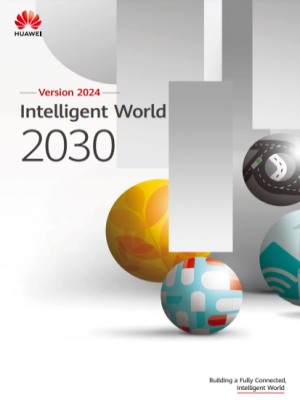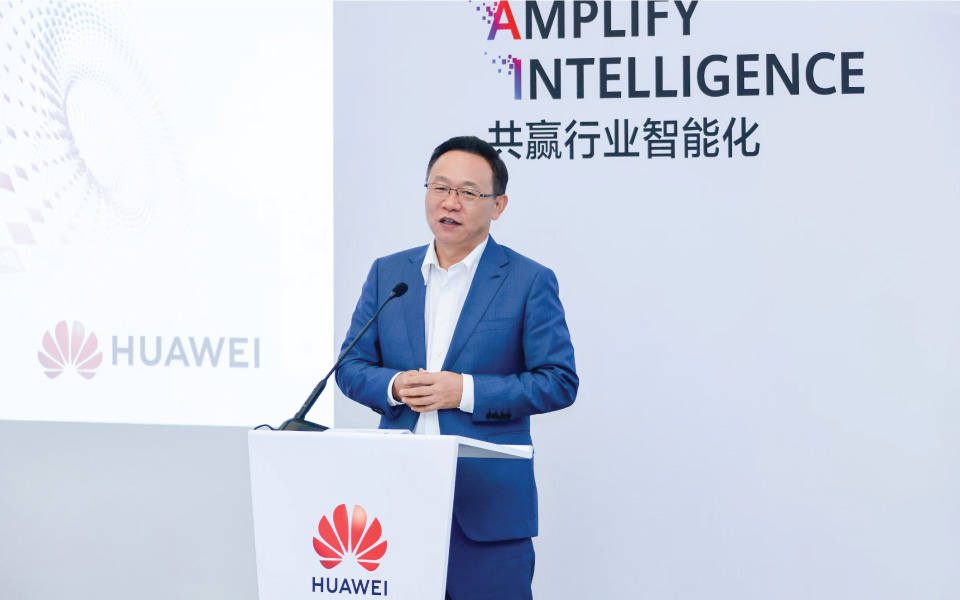Huawei held a forum with the topic of Embracing Intelligence for a Thriving Digital Economy. At the forum, Huawei released a set of reports on exploring the intelligent world, providing references for the development of the ICT industry.
Country Rankings
GDI 2024 follows the digital development of 77 countries and shows a positive correlation between the GDI and GDP. The 77 countries are grouped into three clusters — Frontrunners, Adopters, and Starters — according to their level of ICT maturity and economic development. This research covers countries that represent a total of 93% of the world's GDP and cover 80% of the world's population, which gives a good indication of the general progress in global digital transformation.
FRONTRUNNERS
| RANK | COUNTRIES | SCORE |
|---|---|---|
| 1 | United States | 78.8 |
| 2 | Singapore | 76.1 |
| 3 | Sweden | 74.5 |
| 4 | Finland | 73 |
| 5 | Denmark | 71.8 |
| 6 | Switzerland | 71.4 |
| 7 | Netherlands | 69.7 |
| 8 | China | 69.2 |
| 9 | Ireland | 68.1 |
| 10 | Australia | 67.6 |
| 11 | United Kingdom | 66.8 |
| 12 | New Zealand | 65.6 |
| 13 | Norway | 64.9 |
| 14 | Germany | 63.4 |
| 15 | France | 62.2 |
| 16 | United Arab Emirates | 61.4 |
| 17 | Canada | 61.3 |
| 18 | Belgium | 60.5 |
| 18 | South Korea | 60.5 |
| 20 | Japan | 58.8 |
| 21 | Luxembourg | 58 |
| 22 | Austria | 57.3 |
ADOPTERS
| RANK | COUNTRIES | SCORE |
|---|---|---|
| 23 | Saudi Arabia | 54.4 |
| 23 | Portugal | 54.4 |
| 25 | Spain | 54.3 |
| 26 | Estonia | 54.1 |
| 27 | Italy | 50.2 |
| 28 | Malaysia | 49.9 |
| 28 | Greece | 49.9 |
| 30 | Chile | 49.5 |
| 31 | Czech Republic | 49.1 |
| 32 | Romania | 49 |
| 33 | Hungary | 48.9 |
| 34 | Lithuania | 48.7 |
| 35 | Slovenia | 48.1 |
| 36 | Poland | 47.8 |
| 37 | Thailand | 47.2 |
| 38 | Croatia | 46.7 |
| 39 | Bulgaria | 46.5 |
| 40 | Brazil | 44.8 |
| 41 | Bahrain | 44.7 |
| 42 | Slovakia | 43.7 |
| 43 | South Africa | 43.4 |
| 44 | Kuwait | 43 |
| 45 | Serbia | 42.2 |
| 46 | Oman | 41.7 |
| 47 | Türkiye | 41.4 |
| 48 | India | 40.3 |
| 49 | Colombia | 39.9 |
| 50 | Mexico | 39.6 |
| 51 | Peru | 38.7 |
| 52 | Uruguay | 38.6 |
STARTERS
| RANK | COUNTRIES | SCORE |
|---|---|---|
| 53 | Vietnam | 36.7 |
| 54 | Argentina | 36.5 |
| 55 | Costa Rica | 35.4 |
| 56 | Philippines | 34.9 |
| 57 | Morocco | 34.3 |
| 58 | Kazakhstan | 33.2 |
| 59 | Indonesia | 33.1 |
| 60 | Egypt | 32.7 |
| 60 | Uzbekistan | 32.7 |
| 62 | Tunisia | 32.6 |
| 63 | Ecuador | 32.4 |
| 64 | Jordan | 32.2 |
| 65 | Kenya | 32 |
| 66 | Azerbaijan | 31.6 |
| 67 | Dominican Republic | 30.9 |
| 68 | Pakistan | 28.5 |
| 69 | Algeria | 28.4 |
| 70 | Bolivia | 28.3 |
| 71 | Botswana | 27.5 |
| 71 | Ghana | 27.5 |
| 73 | Uganda | 27.4 |
| 74 | Nigeria | 27.3 |
| 75 | Namibia | 27.1 |
| 76 | Bangladesh | 26.5 |
| 77 | Tanzania | 25.3 |
Digital Transformation Maturity
The GDI measures the digitalization progress of 77 countries using 42 indicators under the four crucial enablers: Ubiquitous Connectivity, Digital Foundation, Green Energy, and Policy & Ecosystem. This research covers countries representing a total of 93% of the world's GDP and encompassing 80% of the global population, meaning it gives a good indication of the general progress in global digital transformation.
The GDI examines the correlation between ICT industry maturity and digital economic growth. Our analysis shows that countries with higher GDI scores experience greater economic benefits from ICT development. Our further correlation analysis of GDI score changes and GDP growth across the three clusters reveals that each one-point increase in the GDI score of Frontrunners can boost GDP per capita by US$945, which is 2.1 times the increase observed for Adopters and 5.4 times that for Starters.
To find ways to bridge the digital divide, the GDI research analyzed the performance of the three clusters in three technology enablers (as shown below), revealing that the biggest gap is in ubiquitous connectivity. Frontrunners lead Adopters by 15 points and Starters by 35 points in ubiquitous connectivity. In digital foundations, Frontrunners lead Adopters by 30 points, while the difference between Adopters and Starters is relatively small.
STEM graduates are a major source of the ICT workforce. Research shows that the proportion of STEM graduates in the three clusters of countries is similar at about 25%. However, the conversion rate to ICT professionals varies greatly by country due to the discrepancies in local ICT industry development, which directly impacts available ICT jobs. 95% of STEM graduates can find jobs in ICT or ICT-related fields in Frontrunners. However, in Adopters and Starters, this number drops to 50% and 15%, respectively.
Key Findings of GDI 2024
The maturity of the ICT industry is strongly correlated with GDP per capita growth, but the extent of economic benefits varies by country due to their different levels of ICT development. In Frontrunner countries, for example, a one-point increase in GDI score produces 5.4 times the economic value than a one-point increase in Starter countries.
Forward-looking digital infrastructure development serves as a new engine for economic growth. Countries around the world are currently racing to digitalization. Our research found that a one-US-dollar investment in digital transformation results in an 8.3-US-dollar return in a country's digital economy.
The ICT industry is progressing unevenly across countries. However, ubiquitous connectivity can bridge the digital divide. Fixed broadband and mobile broadband can work in concert to maximize the value of the digital economy, and a robust digital foundation and ubiquitous connectivity can reinforce each other, creating a multiplier effect on economic development.
Countries must embrace green energy technologies to gear up for the sustainable growth of their digital economies and large-scale application of AI.
National medium- and long-term ICT plans, supportive industry policies, and moderately advanced investment in digital infrastructure are catalysts for the development of the digital economy.
University graduates with a STEM background account for almost 25% of the total in all surveyed countries, but the rate of their conversion to ICT professionals varies greatly by country cluster: 95% in Frontrunners, 50% in Adopters, and 15% in Starters.
Related News
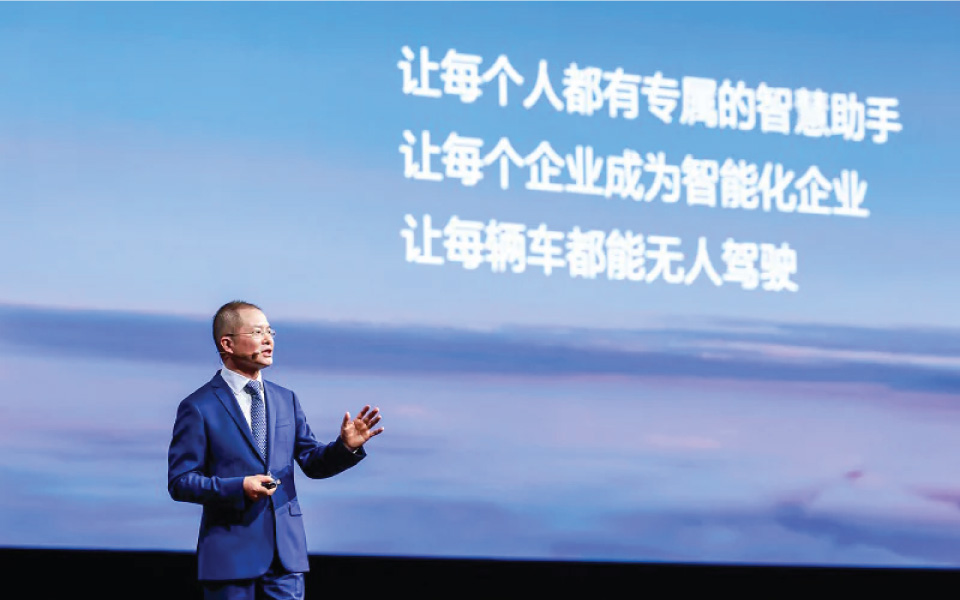
Paving the Way for All Intelligence, and Amplifying Industrial Digitalization and Intelligence
Huawei Connect 2024 kicked off in Shanghai yesterday. Under the theme of "Amplify Intelligence", this event is intended to explore how different industries can go digital and intelligent to seize new opportunities.

Huawei's David Wang: Creating New Ecosystems Amplifies Industrial Digitalization and Intelligence
David Wang, Huawei's Executive Director of the Board and Chairman of the ICT Infrastructure Managing Board, delivered a keynote speech titled "Amplifying Industrial Digitalization and Intelligence".

Huawei Launches F5G-A Series Products for Five Industrial Intelligence Scenarios
Huawei successfully held the optical summit themed "Accelerate F5G-A, Amplify Intelligence". At the summit, Huawei launched new F5G Advanced (F5G-A) products based on the "3 In 3 Out" trends, with an aim to boost industrial intelligence.


